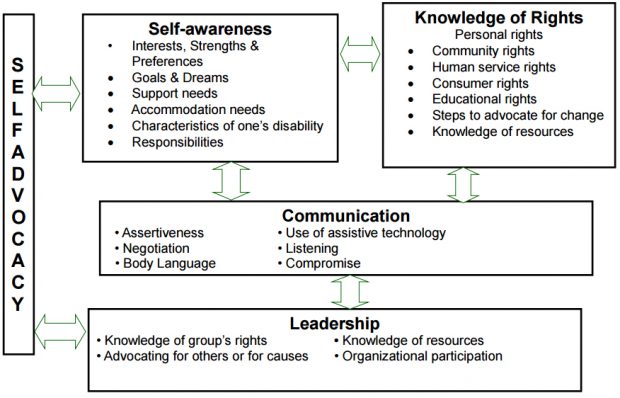You are here
Self-Advocacy and Educator Resources

Jump to a section:
Self-Advocacy
Self-advocacy involves being able to identify your needs, understanding your rights and communicating effectively. In the early years of your child’s life, you as a parent have an important role in advocating for the rights of your child with a brain injury. As your child grows older, it is important that your child learn self-advocacy skills so he/she can advocate for needs when you are not around.
Self-Advocacy Characteristics

From Independent Living Research Utilization
General Resources
- What is Self-Advocacy, and Why is it Important?
By Center for Parent Information and Resources - Advocacy Tool kit: Skills and Strategies for Effective and Peer Advocacy
By Brainline - Self-Advocacy for Independent Life (S.A.I.L.)
A Project of the Brain Injury Association of Colorado
Communication Skills
- Strategies to Improve Communication After a Brain Injury
By Brain Injury Partners
Navigating Resources
There are a number of organizations who help families get connected to resources and services. Some of these are listed below.
Brain Injury Association of CO
- The Brain Injury Association of Colorado is the go-to resource for help and services for survivor of an injury to the brain, their families and providers. Click on “Kids with Brain Injury” on the top navigation bar for more specific resources for children/youth and their families.
- Supports families with a child who has special needs (ages birth to 21) to help connect them with services, provide information and address questions.
(Brochure English, Brochure Spanish)
- Supports families of all disability conditions to ensure they have access to strategies to best advocate for their children.
- Parent to parent support for families who have a child with health needs or a disability.
- Provides advocacy services for families.
Parents Encouraging Parents (PEP)
- Provide family centered conferences to provide support and education to parents as well as professionals.
- Affordable legal services on civil or human rights for individuals with a disability.
- Support services for children (0-2 years) who have developmental needs.
- Support for Spanish speaking families who have a child with special needs.
Visit the Brain Injury Association of Colorado Resource Directory
Educator Resources
Website Resources
- Brain Injury Association Of Colorado - Brain injury resource navigation and educational consultation.
- Brainline - A national multimedia project offering information and resources about preventing, treating, and living with TBI.
- Brainline For Kids - Information and resources for families and educators.
- Centers For Disease Control And Prevention - Basic information, data, statistics, reports, fact sheets. etc. on TBI and concussion.
- Centers For Disease Control And Prevention – Heads Up - Provides tools to help educators, coaches, providers, and parents recognize, respond to, and minimize the risk of concussion or other serious brain injury.
- Centre For Neuro Skills - A monthly update of brain injury news.
- Get Schooled On Concussions - Offers a series of one-page concussion fact sheets for teachers, administrators, school nurses, counselors and parents.
- Lash And Associates - Information and resources on traumatic brain injury, concussion, blast injury, and PTSD.
- National Association Of State Head Injury Administrators - Information on brain injury and juvenile justice systems/corrections, state special education definitions and resource materials.
- Project Learnet - Assists parents and teachers to identify useful procedures to help students in school and at home. Instructional videos are utilized to teach material.
- TBI Center On Brain Injury Research And Training - Brain Injury Education Resources
On Demand Learning
- What is Brain Injury?
- Youth Considerations at Home and in School
- Children can Learn about Building a Healthy Brain
- Challenging Behavior and Executive Function (video modules)
- Brain Injury: Special Education Criteria and Social Emotional Intervention
- Eligibility and School-Based Inter-Disciplinary Assessment and Intervention: A Common Sense Approach


Connect With Us





